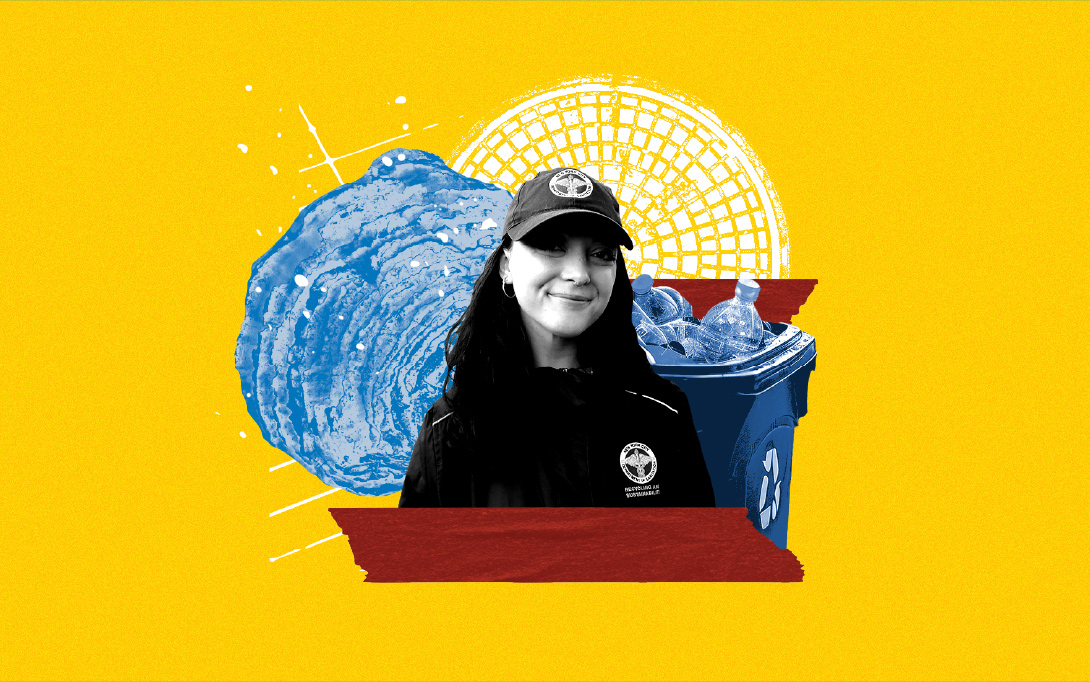
When Emma Renzi Wise (BA ’19) got hooked on learning about environmental policy at the Ford School, she never imagined working for the New York City Department of Sanitation. But nearly six years after leaving Ann Arbor, Wise is the community coordinator of a program called donateNYC. Her job isn’t about handling waste but is about keeping materials of all sorts out of NYC garbage cans and ultimately landfills.
In her role, Wise partners with more than 50 nonprofit organizations—food pantries, thrift stores, book stores, and larger charitable organizations to name a few—to promote reuse. donateNYC also offers online tools to help New Yorkers find places to donate and receive donated items as well as helping nonprofit partners quantify the environmental impacts of their work.
“We have a tremendous coalition of nonprofits that you wouldn’t think have anything in common, but they are all working toward a similar goal of diverting waste from landfills,” she explains.
For example, she supports the Billion Oyster Project, an initiative to rebuild oyster reefs in NYC waterways. The project collects discarded oyster shells from restaurants, then seeds them with oyster larva, and plants them at reef sites, where they clean water, improve underwater ecosystems, and act as a natural defense against storm damage.
At the Ford School, I learned that a lot of the problems I’m most interested in are happening at a local scale, and the solutions to them inherently need to be local in scope and practice.
Emma Renzi Wise
A food rescue organization received a large donation of children’s toys they were not able to distribute. They connected with fellow donateNYC partner Second Chance Toys to distribute to local families in need.
Wise also helped to find a location—specifically The Yard Adventure Playground on Governor’s Island—to reuse a manhole that was part of an art exhibition. “The kids have turned it into a fort; they’ve painted all over it,” Wise says. “It’s so cool to see!”
As an undergraduate student at Michigan, Wise found her way to the Ford School because she truly believed in the tagline, “Major in making a difference.” Growing up in Florida where she constantly heard about sea level rise, she knew she wanted to pursue a career related to environmental justice.
“At the Ford School, I learned that a lot of the problems I’m most interested in are happening at a local scale, and the solutions to them inherently need to be local in scope and practice,” she says.
“I often think about the very first class I took at the Ford School, where I learned about the concept of strange bedfellows and how important that is to creating strong policy,” Wise says. “We often bring together different types of people—sanitation workers, artists, and even anthropologists. It’s the stuff that makes this work inspiring and fun, and it’s what makes actual policy work.”
Looking to the future, Wise is excited about a new project to create repair cafés, where New Yorkers can bring broken items to be fixed. And she’s committed to a continued focus on local government.
“Local government has a unique ability to understand the population they are working for,” she says. “I feel I get to work for and with the citizens of New York City, and I feel like I’m a stakeholder as well.”
By Sheri Hall
More in State & Hill
Below, find the full, formatted spring 2025 edition of State & Hill. Click here to return to the spring 2025 S&H homepage.